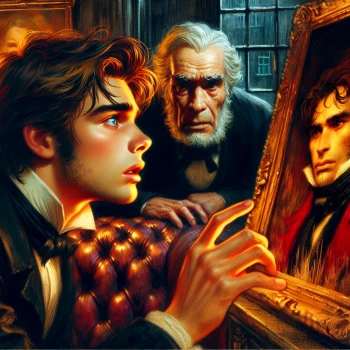
Oscar Wilde
Oscar Wilde was a brilliant social commentator and literary wit who used satire and symbolism to critique Victorian society's moral hypocrisy and advocate for personal authenticity and intellectual freedom.
Full Name: Oscar Wilde
Born: Family Residence, Dublin, Ireland on October 16th, 1854
Died: Paris, Paris, France on November 30th, 1900
Lived: Bloomsbury, London, United Kingdom
Notable Works
Oscar Wilde remains one of literature's most dazzling and controversial figures, celebrated for his sharp wit and profound exploration of societal conventions. Among his most enduring works is "The Picture of Dorian Gray," an iconic novel that blends elements of Gothic fiction and philosophical inquiry. Wilde masterfully examines themes of vanity, moral corruption, and the duality of human nature through the captivating and tragic figure of Dorian Gray, a character whose beauty and charm hide a dark, unsettling secret.
Additionally, Wilde's contributions to theatre, notably the comedic masterpiece "The Importance of Being Earnest," showcase his unrivaled talent for satire and social commentary. This play, celebrated for its clever dialogue and humorous critique of Victorian manners and hypocrisy, continues to delight audiences with its enduring wit and charm. Through these influential works, Wilde consistently explores the tension between appearance and reality, and the moral ambiguity inherent in human desires, securing his lasting legacy as a pivotal literary voice of his era.
Books by Oscar Wilde
Overview & Analysis
Oscar Wilde was an influential literary figure whose sharp wit and incisive social commentary challenged the rigid conventions and moral hypocrisy of Victorian society. Renowned for his flamboyant personality and eloquent prose, Wilde championed aestheticism, emphasizing beauty and art as paramount values that transcend utilitarian and moralistic constraints. His celebrated novel, "The Picture of Dorian Gray," epitomizes his philosophical exploration of internal moral evolution, personal integrity, and the corrupting influence of superficiality. Through his clever use of satire, symbolism, and allegory, Wilde persistently critiqued societal norms, class structures, and the oppressive nature of institutional law and religious dogmatism. Advocating intellectual freedom, ethical autonomy, and emotional authenticity, Wilde's works continue to resonate profoundly, underscoring the timeless tension between individual expression and societal expectations. Despite his tragic downfall and imprisonment, his influential legacy endures, inspiring generations of readers and artists to embrace tolerance, critical thinking, and genuine self-expression as paths toward authentic human fulfillment.
Back to TopInfluences & Worldview
Oscar Wilde was an incisive social commentator and philosophical thinker whose works often critiqued the superficiality and moral hypocrisy of Victorian society. Born into a period of rigid social norms and class structures, Wilde used his sharp wit, humor, and biting satire to challenge traditional conventions. He placed profound importance on individual moral judgment and ethical autonomy, believing passionately in intellectual freedom and emotional sincerity over societal conformity. Through symbolic and allegorical storytelling, Wilde explored themes of internal moral evolution, personal integrity, and loyalty, frequently critiquing the oppressive nature of institutional law and capitalist morality. His unique blend of aestheticism and social criticism allowed him to question the foundations of authoritarian governance and religious dogmatism, advocating instead for tolerance, personal authenticity, and critical thinking as pathways to genuine human expression and fulfillment.
Relevant Historical Events
- Industrial Revolution (UK) (1760 – 1870): A time of rapid industrial, economic, and social change that restructured daily life and redefined childhood in Victorian England.
- The Victorian Era (1837 – 1901): The Victorian era was a period of significant change in the United Kingdom, marked by industrial, cultural, political, scientific, and military change within the United Kingdom, and was marked by a great expansion of the British Empire.
- Jack the Ripper Murders (1888): A series of brutal murders in London's East End committed by an unidentified serial killer, known as Jack the Ripper, which resulted in widespread fear, sensational media coverage, and highlighted social inequalities in Victorian society.
- Foundation of Psychoanalysis (1890 – 1900): The foundation of psychoanalysis by Sigmund Freud introduced a revolutionary approach to psychology, emphasizing unconscious processes and their influence on human behavior and thought.
Notable Characters
Oscar Wilde's characters often epitomize the tension between surface elegance and hidden moral complexities, reflecting his fascination with aestheticism and the duality of human nature. The charismatic yet morally ambiguous Dorian Gray, from Wilde's celebrated novel "The Picture of Dorian Gray," exemplifies this fascination, embodying the seductive allure of beauty and youth while concealing a corrupted soul beneath an immaculate facade. Lord Henry Wotton, another memorable character from the same novel, serves as an eloquent philosopher of hedonism whose provocative wit and cynical worldview profoundly influence Dorian’s tragic descent. Wilde's flair for creating sophisticated, witty, and often morally conflicted individuals is also evident in the character of Lady Bracknell from his comedic masterpiece, "The Importance of Being Earnest." Through her sharp tongue and rigid adherence to societal conventions, Lady Bracknell humorously critiques Victorian society's superficiality and hypocrisy. Collectively, Wilde's characters embody the decadence, aesthetic obsessions, and social contradictions of his era, skillfully revealing the author's critical perspective on the moral and cultural dilemmas of late Victorian society.
Back to TopThemes of Focus
Oscar Wilde's literary work consistently explores themes centered on aestheticism, decadence, and the duality of human nature. His primary theme of aestheticism examines the philosophy of art for art's sake, emphasizing beauty and sensory experiences without moral or political agendas. This connects deeply with his exploration of decadence, reflecting the indulgent and often morally ambiguous lifestyles portrayed in his stories, indicative of late Victorian society's fascination with pleasure and excess.
The duality of human nature is another prominent theme, exemplified vividly in Wilde's examination of outward beauty versus internal corruption, notably depicted in "The Picture of Dorian Gray." Secondary themes, such as societal hypocrisy and the superficiality of social status, reinforce the primary themes by critiquing the values and moral contradictions of Wilde's contemporary society.
These themes are deeply reflective of Wilde's worldview and the historical context of the late 19th century, a period marked by societal constraints and burgeoning individualism, which profoundly influenced Wilde's critical perspective on Victorian morality and aesthetics.
Back to TopLegacy & Impact
Oscar Wilde's enduring legacy remains deeply influential across literature, philosophy, and social thought. Renowned for his sharp wit, eloquence, and incisive critique of Victorian society, Wilde challenged prevailing norms and moral hypocrisy, profoundly shaping literary modernism and aesthetic philosophy. His plays and novel, especially "The Picture of Dorian Gray," remain timeless, exploring universal themes of vanity, moral decay, and the complexities of identity and desire.
Wilde's advocacy for individualism and ethical autonomy continue to resonate today, making him an important figure in discussions about personal freedom, authenticity, and societal conformity. Academically, Wilde is widely studied in schools and universities, his works serving as critical examinations of the constraints imposed by rigid social structures and moral dogma. His life and career are also a poignant reflection of the struggles against oppression, notably regarding sexuality, providing critical historical context in LGBTQ+ scholarship and activism.
Though once controversial and subject to societal condemnation, Wilde's reputation has undergone significant rehabilitation. Today, he is celebrated as a literary genius and a cultural icon, frequently adapted in theatre, film, and literature, underscoring his lasting relevance and profound impact on contemporary culture and thought.
Back to TopConclusion
Oscar Wilde's works continue to resonate profoundly in modern times, offering timeless critiques of societal hypocrisy and the enduring struggle for personal authenticity. His incisive wit and elegant prose have significantly shaped literary traditions, inspiring writers to blend sharp social commentary with artistic beauty and emotional sincerity. Wilde's unwavering commitment to ethical autonomy and intellectual freedom remains deeply relevant, encouraging contemporary readers to question conventional norms and uphold individual moral judgment. Exploring Wilde's stories today not only enriches understanding of the complexities inherent in human nature and societal structures but also fosters a deeper appreciation for literature as a powerful vehicle for truth, tolerance, and genuine self-expression. His legacy endures as a beacon for those who seek to challenge superficiality and embrace a more thoughtful, authentic way of engaging with the world.
Back to Top